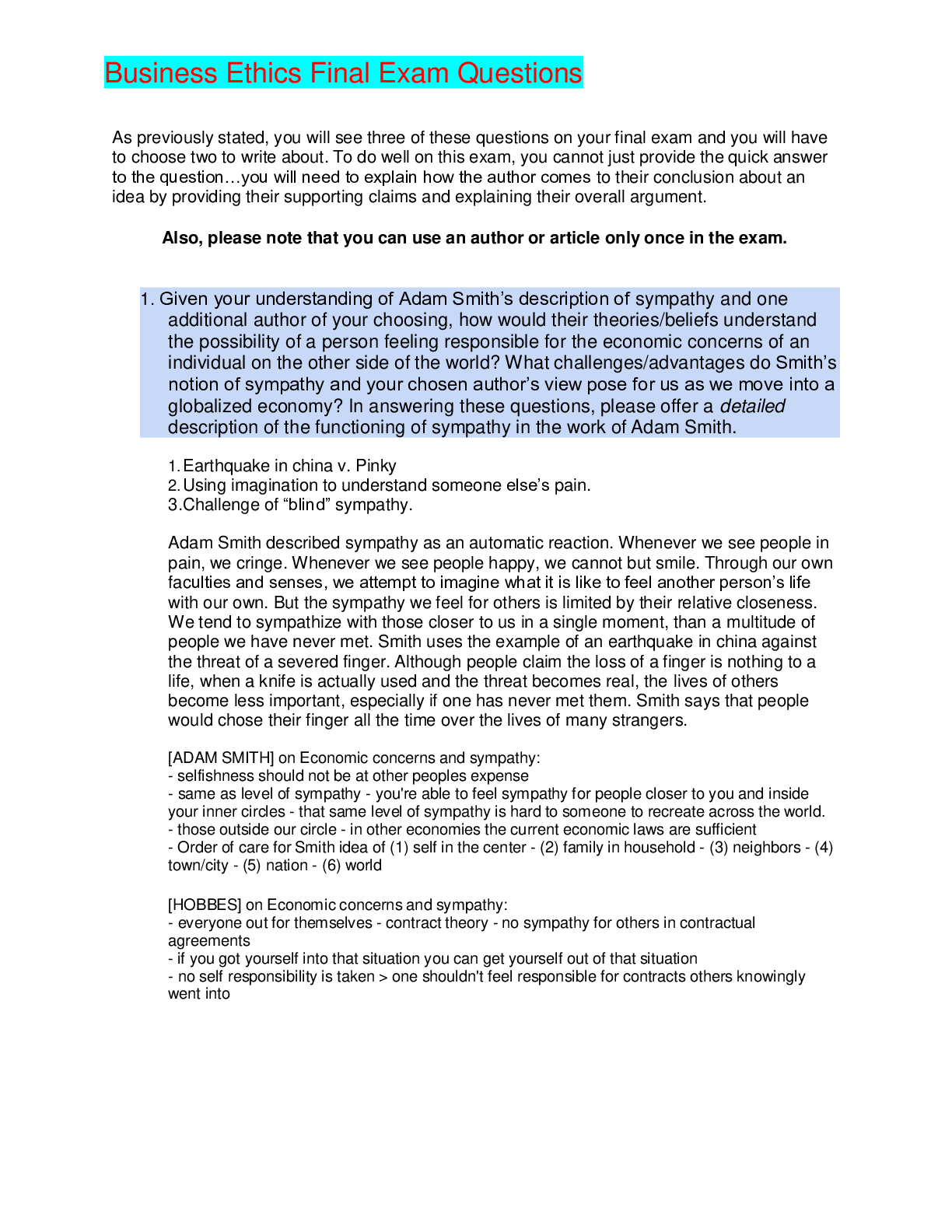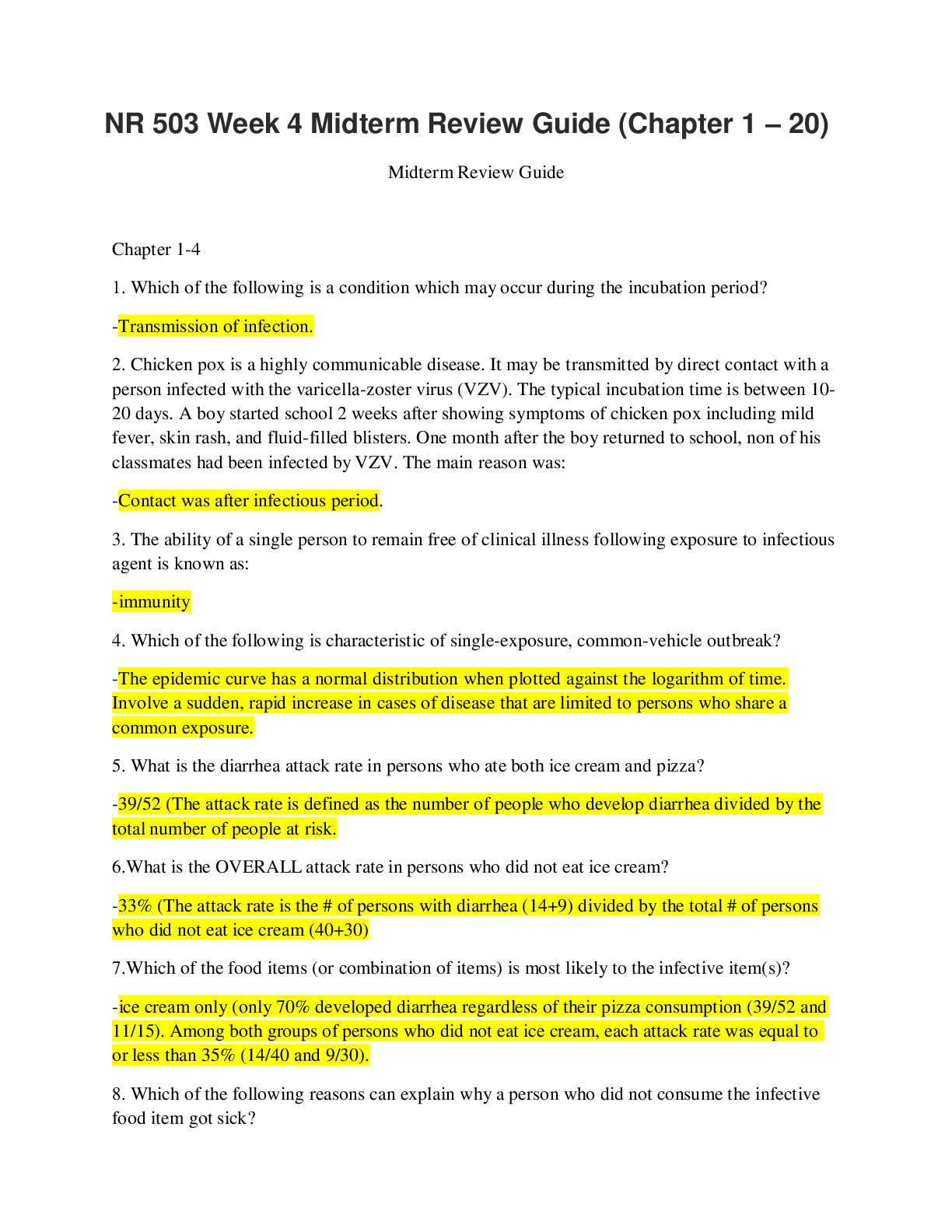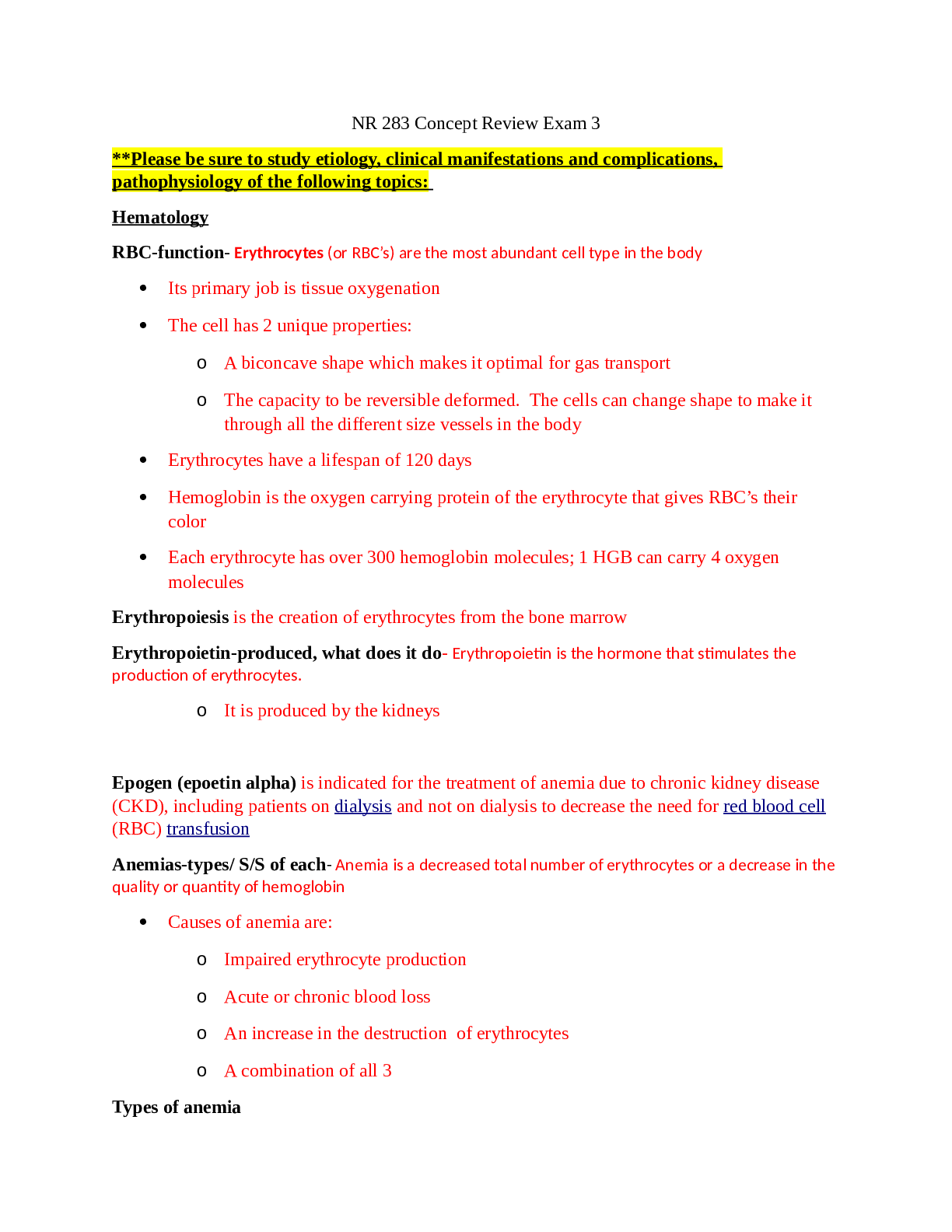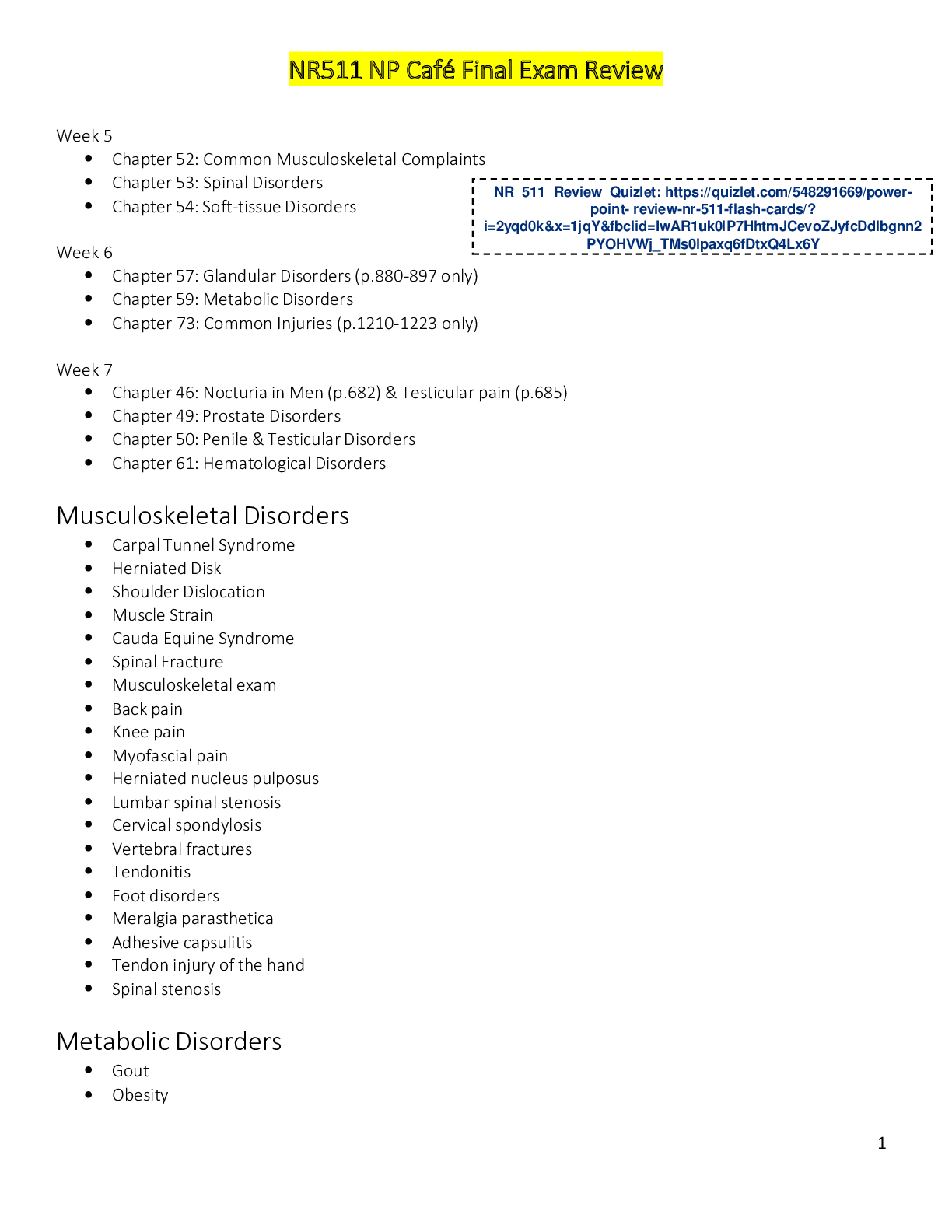Business > EXAM REVIEW > Business Ethics Final Exam Review _ MGT 300 | Download To Score An A+ Grade (All)
Business Ethics Final Exam Review _ MGT 300 | Download To Score An A+ Grade
Document Content and Description Below
As previously stated, you will see three of these questions on your final exam and you will have to choose two to write about. To do well on this exam, you cannot just provide the quick answer to the ... question…you will need to explain how the author comes to their conclusion about an idea by providing their supporting claims and explaining their overall argument. Also, please note that you can use an author or article only once in the exam. 1. Earthquake in china v. Pinky 2. Using imagination to understand someone else’s pain. 3.Challenge of “blind” sympathy. Adam Smith described sympathy as an automatic reaction. Whenever we see people in pain, we cringe. Whenever we see people happy, we cannot but smile. Through our own faculties and senses, we attempt to imagine what it is like to feel another person’s life with our own. But the sympathy we feel for others is limited by their relative closeness. We tend to sympathize with those closer to us in a single moment, than a multitude of people we have never met. Smith uses the example of an earthquake in china against the threat of a severed finger. Although people claim the loss of a finger is nothing to a life, when a knife is actually used and the threat becomes real, the lives of others become less important, especially if one has never met them. Smith says that people would chose their finger all the time over the lives of many strangers. [ADAM SMITH] on Economic concerns and sympathy: - selfishness should not be at other peoples expense - same as level of sympathy - you're able to feel sympathy for people closer to you and inside your inner circles - that same level of sympathy is hard to someone to recreate across the world. - those outside our circle - in other economies the current economic laws are sufficient - Order of care for Smith idea of (1) self in the center - (2) family in household - (3) neighbors - (4) town/city - (5) nation - (6) world [HOBBES] on Economic concerns and sympathy: - everyone out for themselves - contract theory - no sympathy for others in contractual agreements - if you got yourself into that situation you can get yourself out of that situation - no self responsibility is taken > one shouldn't feel responsible for contracts others knowingly went into [BISHOPS & POPE] • Def of economy: - language is what matters - focus on the poor and inequality of persons - pay attention to people rather than the process - more desires and growth but less joy - more about the community being provided for as a whole • Respective def of freedom & justice: believe in distribution justice and social justice. - Distribution justice: measures and responds to the dignity of people after fair contracts have been exchanged or agreed to (looks at the result) - Social justice: maintaining ones proper relation to communities and markets (providing a way for people to take care of themselves - if possible • Beliefs regarding - distribution of income/resources: larger distribution and private property isn't an absolute right - there is a limit • Society intervenes or doesn't: - when the market is not free or perfect - private property based on when inequality is great society needs to intervene or if human dignity is being undermined [MILTON FRIEDMAN] • Def of economy: - economy driven and believes in the free market - about individuals getting what they want in exchange - main obligation to one another through negative capabilities (getting out of people's way) versus positive capabilities (doing something for another) • Respective def of freedom/justice: -Friedman prefers old liberalism - as long as you can enter into a contract freely - you are free ( transaction is a CONTRACT that is: BILATERAL, VOLUNTARY, & INFORMED) - less government is worth the wait of welfare and equality given freedom •Beliefs regarding distribution of income/resources - control of private property - everyone desires their wealth -once people start receiving its harder to get rid of it. (every institution will give a rationale to stay) • Society intervenes or doesn't intervene: - maintenance of law and order - enforce contracts - defining property rights - need to know what we are trading/buying - provision of a monetary framework - makes trades easier -friedman says we need govt to prevent physical harm [BOTH] • Def of economy: NOTHING • Respective def. of freedom and justice: - Commutative justice: fairness and transparency in contractual exchanges - not coerced! *THINK: voluntary, informed, and bilateral 1. Svendsen names distinct time periods and how people within each conceived of the role of work. Often this is done by explaining how some concept of religion or god/gods affects how one thought about work. Please name three of these periods, describe what was distinct about the conception of work within each, and then explain the connection between three other assigned texts/articles and the fundamental views of each time period. [HOBBES] • Describe how they define desire or how they critique some understanding of desire: - desire is natural and we should seek it in all cases! • How respective def and descriptions of desire affect their understanding of needs, the responsibility that one person has for another? - we are free moral agents to do what we please - we always have desires and we always chase them > we are aiming at nothing and we will find no rest - everything is a want in the same: new car and shelter are all wants and desires - people do not have a responsible to each other > someone only has value if we give them value and we form contracts with them - peace is necessary to get more desires [GALBRAITH] • Describe how they define desire or how they critique some understanding of desire: - if it is natural and born within us it is okay > but if it is created by outside forces it is not okay • How respective def and descriptions of desire affect their understanding of needs, the responsibility that one person has for another? - believes that there is a hierarchy of wants and needs - separate by urgent wants (foods, shelter, and clothing) and wants (new Mercedes) - rejects that needs are never ending - market influences desires - problem with conflating urgent wants and wants - society could meet all people's urgent wants and we have a responsibility to make sure people have urgent wants before luxury wants 1. Over the semester we have regularly encountered authors who have made a claim about how work forms or deforms one’s identity, how work affects a relationship with faith and others, and if one should turn to one’s work for personal formation or see it as a simple contractual and material exchange. Employing three authors from the quarter, explain how each would respond to one or more of the aforementioned claims. [US BISHOPS] - faith requires outward actions > performance and actions - faithful actions can be rationally understood - faithful actions are not confined to the faith community - believe in natural law > place where gods plan overlaps human plan - rational persons can come to a consensus for human flourishing - focus on people more than process > put people in the center of the economy - look out for the poor and unequal - 3 types of justice 1. communitive justice: fairness and transparency in contractual exchanged (bilateral, voluntary, and informed) 2. distributive justice: measures and responds to the dignity of people after fair contracts have been exchanged or agreed to 3. social justice: maintaining ones proper relation to communities and markets - Def of economy: focus on the poor and inequality of persons - pay attention to the people instead of pure process - more desires and growth but less joy (acquire more - but happier?) - put people at the center of attention - if communitive justice fails > distributive or social justice follows [HOBBES] - state of nature > pure and chaotic - people related only through contracts - desire for knowledge and peace is what allows us to have society - we form a common power through contracts - you have no responsibility to others - unless stated in contract [MARKETING CASE STUDIES] (Sony | Saeed | Galbraith) SONY: - shouldn't have to change a product because of the negative acts of one individual because it wasn't affecting community as a whole > deep harm or widespread harm and Agreeance - contractual thinking - should avoid coercion - lookout for most vulnerable - promote trust exchange - no agreement is necessary until deep harm or agreement of harm is being done SAEED: - no division between economic and religion > they still have responsibility to their religion through economics - not promoting sex, luxury, hoarding, empathy, and mercy (value-maximization) - enough common values to be looking out for each other > communal mindset - all endeavors are ultimately religious and spiritual GALBRAITH: - forget who is in control between marketer and consumer - rejects conflating of urgent wants and wants - producers are in charge - responsibility of society should fulfill people's urgent wants before we pursue our own wants 1. While using readings from class, discuss at least three authors’ arguments regarding what should be subject to free market forces and what requires government intervention. Restated, is society best served when all products (e.g. drugs, guns, privacy) or social reforms (e.g. equality in the workplace, discrimination) are subject to the market? Or, do we justifiably keep some products or reforms from the decisions of the market? Please provide an author’s justification for their argument and not just their solution. Part of this will include a description of the author’s position on how freely the market operates. [MILTON FRIEDMAN] • is society best served when all products or social reforms are subject to market? - believes in the free market > not in government intervening unnecessarily - discrimination is a product > looks at it through an economic lens (positive vs. negative harm) - everything is fair game because in contractual agreements we do not enter into things we know will harm us - so yes: he believes that they should be subject to market with provision > positive harm needs intervention - against products that will hurt others (guns, porn) because others do not willingly enter into the contract of being harmed > it is out of their control (negative externalities = govern. should intervene) • How freely does the market operate: - strive for free market always > limited government power - free of monopolies > everyone should have a fighting chance - engage in free and open competition > do not commit fraud and coercion [AMERICAN MARKETING ASSOCIATION] • is society best served when all products or social reforms are subject to market? - promote whatever you want because the consumer should be informed to make own decisions - contract & modified contract: no change to product unless great harm or agreeance of harm is present > contract and covenant - contract and covenant together > they combine - we have to allow products to be available because consumers create the want > marketers fill the need but restrict with 2 questions: 1. what is the product harms the consumer? 2. What is the product harms more than the individual consumer? (#2 is a problem> guns, porn, etc.) • How free does the market operate? - market operates on consumers wants and needs > they are there to fill the needs - marketers should develop a good sense of citizenship > community relevant - doesn't operate freely due to lack of power balance between markets and consumers [SANDEL] • is society best served when all products or social reforms are subject to market? - very much against assigning monetary value to all things - there are limits > coerced into contracts (poor being offered bad contracts but supply a need) and corruption (moral importance of some goods - ending a great day with a friend and paying them $50) - some things are degraded when they are put into the market • How freely does the market operate? - against certain privatization and commercialization of certain moral goods in the society > cannot measure them in a monetary value - trading something that ends up losing dignity 1. The importance of how metaphors are used in defining our world has been a recurring topic throughout this class. What is significant about the metaphors chosen to describe the world? How might a metaphor change what we consider our responsibilities to others? In answering this question, you must employ at least three authors from our class and at least three different examples of how these authors suggest and use metaphors in their arguments. [WEIL & HIRSCH] • what is significant about the metaphors chosen to describe the world? how might it change what we consider our responsibilities to others? - uses metaphors to support emotion in works (pathos) - effects our view of our world (like all) > they use it to shine a light on what people endure on a daily basis - call to empathy to others [WILLIAMS] • what is significant about the metaphors chosen to describe the world? how might it change what we consider our responsibilities to others? - metaphors change the way we think - housekeeping theory needing people and bonds - metaphors = what we actually think > when used wrongly negatives follow (they take away the true meaning) [SMART] • what is significant about the metaphors chosen to describe the world? how might it change what we consider our responsibilities to others? - metaphors can serve us to understand concepts that might seem separate as one, by taking values from one and applying them to the other [EXAMPLES] WEIL: - working to eat or eating to work > she doesn't know which one is which - punch-clock in her chest (heartbeat) always beating which is humanity being overwhelmed WILLIAMS: - housekeeping theory argument > economy being household like Aristotle - housekeeping is using the skills and language you have to build up the household > benefiting the whole rather than individual SMART: - world views and religion: 1. Doctrinal 2. Myths 3. Ethical/Laws 4. Ritual 5. Emotional 6. Institutional 1. Various authors throughout the quarter have argued that one must consider more than just efficiency and absolute freedom of exchange when thinking about human labor, the distribution and marketing of goods, and what defines proper relations to one another. With this in mind and while using the Saeed article on Marketing Ethics from an Islamic Perspective as one of your sources, please describe the arguments made by three authors about why efficiency and/or absolute freedom of exchange between free individuals proves to be inadequate measures and guidelines for the good life. [SAEED] - faith limits to what you can do and cannot do > value-maximization - certain values are over and above economics logic (more than economic logic that comprises us) - rejecting idealism: only value is harm > only harm can prevent actions of others - rejecting relativism: no common values > "you may not like it but plenty of people do, so it's okay" [SCHUMACHER] - buddhism desire is natural but you control your desire - don't believe in excess consumption - existence is full of suffering > one of the 4 noble truth > suffering is caused by unending cravings - consumption should only be used for a means of human well being [ARISTOTLE] - economy creates unnecessary wants because of the coin > the purpose of business end goal should be self-sufficiency and better community - when coin came about creating excess want and profit which degrades our social and moral lives 1. Contract and Covenant (Solidarity) are ultimately two different ways of understanding human nature, society, and the world. Please outline the major beliefs of contract and covenant using the O’Brien article. Then, describe how 3 authors we have read this quarter should be classified using the contract/covenant distinction. Please outline the major beliefs of each author as you make your case for which way they should be classified. [O'BRIEN] •Contract• - persons are solidarity - little in common with others - competition with one another - defensive posture •Convenant• - communal - shared and rich values - cooperation (primary) - sacrifice for others - problems: always will be someone who is a moocher > once this person is found challenge within the whole system [HOBBES] •Contract• - CONTRACT ONLY - give people what they need as long as they give you what you need - no truth without enforcer - cannot trade the impossible > can trade the possible - contract = related to the empirical - everything needs to be measurable and empirical •Covenant• - the only reason we have community is because we have contracts [ARISTOTLE] •Contracts• - no •Covenant• - community is everything! - people need society to thrive - people share rational thought - hierarchy of society models the household - household requires cooperation and sacrifice [AMERICAN MARKETING ASSOCIATION] •Contract• - should avoid coercion - contract & modified contract - everyone is informed and makes decisions for themselves - promote trust in exchange - let the buyer beware and that is the only responsibility you have as a marketer - don't judge consumer > they create the needs •Covenant• - believe in economic and ecological stewardship > you have to give something up - marketers should develop good sense of citizenship > communal relevant 55 1. The ability to claim access to the God, the transcendent, and/or the claim that there are universal beliefs that tie humanity together is critical in determining what is true in this world and what are appropriate actions in this world. Explain the rationale behind this claim employing at least three authors from this class. In doing so, you must explain how the author’s claims about the transcendent or universal beliefs affect the author’s beliefs about what is proper intervention in other people’s lives. This may include, but is not limited to, considerations of types of justice, the role of contracts, positive and negative harm, and human rights. [HOBBES] •Claims about the transcendent or universal belief. - we can only know the world through our senses - we cannot know the transcendent because we cannot know it through our senses - all people have desires that they aim towards •Proper intervention in other people's life: - people create contracts within one another to achieve their desires - there must be someone (enforcer to contracts) to intervene if contracts between are broken/to keep contracts intact (government) [FRIEDMAN] •Claims about the transcendent or universal belief. - people owe one another positive capabilities (doing something to enable one another) and negative capabilities (getting out of the way) - freedom for people to enter contracts (bilateral, voluntary, and informed. •Proper intervention in other people's life: - people should have freedom (old liberalism - economic freedoms >> welfare and equality) - to give people freedom (economic freedom) = free market, government is small and does not intervene much in these affairs - government only for maintaining law, preventing coercion, enforcing contracts, defining property rights, and currency [BOWIE & ARNOLD] •Claims about the transcendent or universal belief. - believe in dignity, people as ends, not means, dignity is beyond price (Kant) - universalism •Proper intervention in other people's life: - dignity is preserved by intervention (positive capabilities) - hope that people follow rules that are in place [Show More]
Last updated: 2 years ago
Preview 1 out of 10 pages

Buy this document to get the full access instantly
Instant Download Access after purchase
Buy NowInstant download
We Accept:

Reviews( 0 )
$9.50
Can't find what you want? Try our AI powered Search
Document information
Connected school, study & course
About the document
Uploaded On
Mar 13, 2021
Number of pages
10
Written in
Additional information
This document has been written for:
Uploaded
Mar 13, 2021
Downloads
0
Views
144









.png)

.png)

.png)











